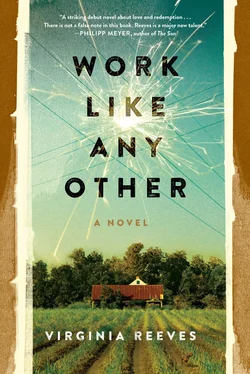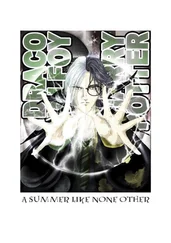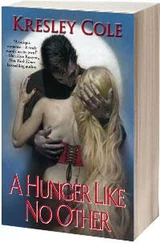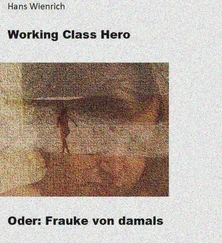“Damn it. Stop.”
My cow turns her head to peer at me, blinking her eyes. They are a pretty breed, honey colored and shining.
“Not you,” I say, folding my words into a few more sounds for the barn. “You’re doing fine. Let’s get these cups attached. There we go.”
I continued telling Catherine stories after our sisters died, but when our father returned, he came in person to tell me to stop: “Keep quiet. We’re trying to get some damn sleep in this place.” Catherine had taken to sleeping in my room, sneaking in after our parents had gone to sleep. My father found her there, and he pulled her from my bed, dragging her to her own room, rich with the emptiness of the sisters she’d shared it with.
“You’re both too big for this,” he shouted.
I waited for the house to settle itself down, then I snuck down the hall and knelt at the head of Catherine’s bed, telling her again the whispered story of the cat who could jump high into the branches of a tree to escape the hunter and his dogs, while the fox with his bag of a hundred tricks died in their clutches. She liked this one best because the cat survived on its own.
Nearly three weeks after our sisters died, I found Catherine asleep when I came to her room. She was asleep again the next night, and I didn’t come again.
Only once was that time in the barn mentioned after it had passed. I was meeting Catherine’s husband at their wedding. He had the blackened hands of the mines and a towering height.
“Pleasure to meet you,” he said when we shook hands. “Catherine told me about that time you two had to spend in the barn when your sisters took ill. I appreciate you looking after her.”
Catherine had hold of his arm, and she smiled broadly. Those days in the barn were some of the last ones with any shared intention between us. She hadn’t understood my leaving coal any better than my parents had.
“She looked after me, too,” I told her husband.
Catherine laughed. “What could I have possibly done, Roscoe? I was a little girl!”
This got a laugh from her husband, too, and they took it as their parting jest, turning their attention to the other guests — mine foremen and owners and the elegant women standing alongside them. You’d never guess they were in the coal industry, clean and kempt as they all were. Only the men’s hands gave them away, and even then rarely. These men had left the tunnels a long time back. My father was across the room, standing next to my mother. When I approached them, he walked away.
We are born with some things in our veins, coal for my father and farming for Marie’s and a deep electrical current for me. My father’s draw started from need, I suppose, and Marie’s father’s from land, and mine from glowing Birmingham streetlamps. I had stared at those bulbs the first time I saw them, the streets lit by a force greater than any I’d known — bigger than me, bigger than my father, bigger than his tunnels even.
“I want to work with electricity,” I remember telling him.
“Them lights are burning because of coal, Son.”
But digging up fuel wasn’t what I meant.
When I left my father’s mine, I went back to Birmingham, and I found an electrician named Wheeler who took me on as his apprentice. My mother answered my letters only occasionally, and my father’s voice was never present. He’s eleven years dead now, and my mother six. Catherine doesn’t write, and I haven’t seen her since her wedding.
My other sisters were named Anna and Margaret. I feel that’s important to say.
Years pass quickly in times of fortune. They fill up with kernels and furrows and sprouts, new fields and crops, beautiful glass-shaded lamps from Birmingham, and meals under wide chandeliers. There is always one more room to wire (never the library), and one more fixture to pick out, the thresher to clean, the lines to check. For two such years Roscoe found himself working the farm — electrical components, yes — but also ordering and oversight and sales. He liked to see the numbers in Marie’s ledger, the productivity so easily measured and displayed.
Marie was a teacher again, and Roscoe was an electrician, and Gerald was a boy who loved his father. In addition to all that, the family farm was prosperous. The county talked about the prosperity, all those other people and farms full of envy at the family’s acquisition of electricity, at Roscoe’s connections with Alabama Power.
In Rockford, Marie tried to downplay their privileges, pointing instead to Roscoe’s and Wilson’s strengths as farmers. She watched Roscoe become respected in their small community. The murmurings about his laziness waned. Whispers about his incompetence ceased. Roscoe T Martin was a farmer. He’d given more to the farm than Marie’s father even. The people remained envious, but they were in awe, as well.
WHENthe sheriff came, Roscoe was eating dinner with Marie and Gerald. They were eating a beef pie, one of Marie’s specialties, with corn on the side.
Marie tilted her head in the direction of the sound. “Who would be calling at this time of day?” She folded her napkin into a rectangle before tucking it next to her plate. “You gentlemen keep eating. I’ll see to whoever it is.”
She put her hand on Roscoe’s shoulder and leaned down to kiss his mouth. Roscoe watched their son look away. The boy had had to grow accustomed to his parents’ intimacies over the past two years, foreign things before that. Roscoe had watched him stare at the first hands held and kisses exchanged, the first lengthy embraces, Marie’s head tucked neatly under Roscoe’s chin. Roscoe could see jealousy in Gerald, and he could also see confusion and betrayal. Marie had been Gerald’s alone, her arms around him, her lips grazing his features, her voice drowning him in its love and care. Then she’d suddenly given her affections to someone else. Roscoe understood Gerald’s need to look away. He’d suffered the same emotions in the years after Gerald’s birth, and he now felt torn between empathy for his son and conquest over his competition.
They’d developed their own new bond as well, and Roscoe could see his son equally torn between hatred of his rival and love of his newfound father.
Roscoe squeezed Marie’s hip as she took herself toward the door, then he tucked back into his meal, whispering through the food in his mouth, “Who do you think it is?”
Gerald was nine, bursting with tales of adventure. “A pirate,” the boy whispered back. “He’s missing an eye, and he’s come for our gold.”
“We’ll have to fight him, then. You want to be the distraction or the sword fighter?”
“Sword,” Gerald whispered, grabbing hold of his dinner knife.
Roscoe could hear the squeak of the door opening, then the whine of the screen. There were voices — Marie’s and a man’s — but no words, something hushed and solemn in their tones. Roscoe worried about a neighbor in need of help he wasn’t interested in giving, not because of laziness or lack of neighborly concern, but out of dislike for the tasks. Rural neighbors needed help hauling broken-legged horses and sick cows. They needed help raising barns and plowing fields. Back in the village the roles were different. Marie had delivered pies, and Roscoe had helped with electrical flukes. Marie had tutored children struggling with their letters, while he had taught husbands how to wire their sheds and shops. He preferred the village tasks.
The voices stopped.
“We may have missed our chance,” Roscoe whispered.
Then Marie was in the dining room doorway. “It’s Sheriff Eddings,” she said quietly. “For you, love.”
Roscoe looked at his son, whose face had gone taut with curiosity and fear. “Bet you didn’t know Sheriff Eddings was a pirate, did you?”
Читать дальше












